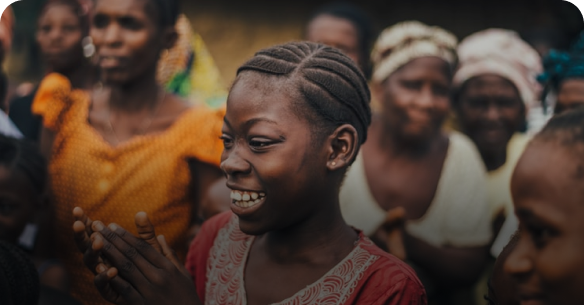Interventions
Main objective
Investing in women's empowerment and human capital as a development strategy for growth.
Currently, more than 80% of adolescent girls are at risk of early pregnancy, child marriage and dropping out of school in West and Central Africa. More than 28 million have already left school, living in rural or border communities with limited access to public services and denied the opportunity to act, express themselves and make their own choices. Girls and young women living in poor rural communities are the most likely to face the greatest barriers to change. The gross enrolment rate for girls in secondary schools in the region is only 42%
Empowering adolescent girls and young women (AGYW) is key to accelerating Africa's demographic transition, to improving human development outcomes and to strengthening human capital and inclusive economic growth. The countries of West and Central Africa have the highest teenage birth rates in the world. AGYWs who lack opportunities are vulnerable to child marriage, early pregnancy and dropping out of school. This limits their employment and life opportunities, and can also put their health at risk.
Conversely, young women with more years of schooling have better control over their fertility, have greater economic opportunities and tend to marry later. The empowerment of girls and women, which translates into better access to health services, education, economic participation and greater autonomy, helps overcome poverty, reduce inequality, enhance productivity and improve children's nutrition, health and school attendance.
Gender-based violence (GBV) is pervasive and undermines girls' education, their health and their opportunities in the labour market. On average, almost half (42%) of women in West and Central Africa say they have experienced physical, sexual or emotional violence from an intimate partner (a form of gender-based violence). Female genital mutilation (FGM) is also widely practised in the region.
Women exposed to GBV are more likely to suffer from depression, abuse alcohol, have low-birth-weight babies and contract HIV. If GBV is not addressed in schools and communities, it will continue to disproportionately affect the life outcomes and well-being of women and girls, at great cost to their communities and countries.
The Women's Empowerment and Demographic Dividend (SWEDD) project began in the Sahel and has made remarkable progress in its implementation in just a few years. This has demonstrated the importance of investing in women's empowerment and human capital as a development strategy for growth.
The new project, SWEDD+, started in 2023 and focuses on improving girls' and women's access to learning, economic opportunities and the use of health services, as well as strengthening the region's institutional capacity in terms of gender equality.
Significant socio-economic progress... Yet challenges remain
Over the past 25 years, progress has been made in the region in terms of access to primary education, women's participation in decision-making and reducing infant mortality, among others. However, if we are to make the most of the demographic dividend, there are still many challenges to be overcome, including health crises (Ebola, COVID-19), security crises (armed conflicts, instability) and food crises (famine, malnutrition).
Overall objective
The overall objective of this initiative, responding to the call launched by the Presidents of the Sahel countries, is to accelerate the demographic transition, trigger the demographic dividend and reduce gender inequalities in the Sahel region.


